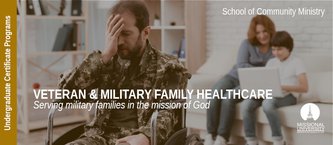
The Undergraduate Certificate in Veteran & Military Family Healthcare provides training in the unique aspects of the veteran and military service member population and health care delivery systems. The program enables graduates to become innovative leaders in caring for veteran and military families with the knowledge and skills needed to coordinate care and treatment options and to deal with the physical and psychological issues of war and military service. Because service-related conditions are both visible and invisible, this online program provides a holistic approach that combines instruction from Christian experts in medical theology, military medical chaplaincy, and healthcare chaplaincy. Students learn to demonstrate the love and compassion of God by advocating for first-class military healthcare systems; caring for the health of veteran & military families; understanding ways spirituality shapes one's perspective of health, disease and medicine; and sharing the good news of redemption, restoration, and renewal in situations of health trauma.
According to the International Institute for Strategic Studies in their 2019 report, more than 14.5 million people serve in the militaries of the top 30 countries with the largest military forces - of that about 1.3 million are active duty in the US military. With over 18 million veterans, the United States has about 20 million veterans and active military - and their families - to serve. Due to the circumstances that active and veteran military have experienced, whether deployed or not, their healthcare needs may include injury, post-traumatic stress disorder (PTSD), suicide prevention, depression, rehabilitation, chronic conditions, end-of-life care and other physical and psychological needs. Through the Undergraduate Certificate in Veteran & Military Family Healthcare, you gain an understanding of not only the veterans and active military dealing with the consequences of war and military service, but also how to best help these patients and families navigate the systems available to them while innovating to assist them more efficiently in the future.